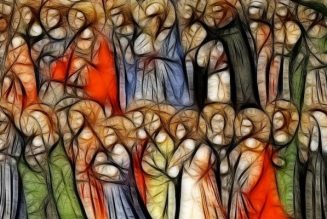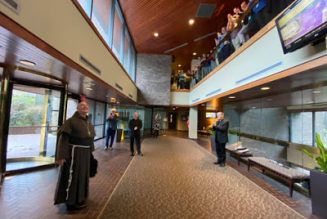|
Listen to this story: |
ROME – From a news point of view on the Vatican beat, a pope being in the hospital is a bit like a blazing sun on a hot summer day – it shines so brightly that it tends to be blinding, and you have to squint to bring anything else into focus.
Thus it was that during the nine days Pope Francis was in Rome’s Gemelli Hospital June 7-16, several other Vatican storylines were, to varying degrees, overshadowed.
Some figures suffered from that neglect – consider Italian Cardinal Mauro Gambetti, for instance, who was the prime mover behind a June 10 gathering of 30 Nobel laureates in St. Peter’s Square to promote Francis’s encyclical on human fraternity, Fratelli Tutti.
In the absence of the pope, Gambetti was left presiding over what the Italian newspaper Messaggero bluntly described as a “flop,” with turnout well below projections and media interest essentially non-existent.
Others, however, arguably benefitted significantly from the lack of scrutiny, perhaps no one more so than Alessandro Diddi, a lay Italian attorney and the Promoter of Justice for the Vatican City State.
To begin with, Diddi last week suffered a largely ignored setback in the Vatican’s slow-moving “trial of the century,” featuring charges of financial crime against 10 defendants, including, for the first time, a cardinal, Italian Cardinal Angelo Becciu.
The Vatican’s tribunal on Tuesday upheld a defense motion to exclude testimony from one of those defendants, lay Italian financier Gianluigi Torzi, which Diddi had wanted to employ against three of the other defendants. In essence, the court held that since Torzi never appeared at the trial and defense attorneys never had the chance to cross-examine him, his testimony could not be used.
The ruling represented an embarrassment for Diddi, and renewed questions about his conduct of the trial.
Diddi is scheduled to present his summation to the court in mid-July, which will include his proposed sentences for the defendants. Defense attorneys will respond in October, after the Vatican’s traditional August break, and verdicts are expected by the end of the year.
It was on a different front, however, where the news blackout arguably paid off for Diddi even more.
On June 6, the same day Francis made an unannounced visit to the Gemelli in what turned out to be preparation for his surgery the next day, Diddi appeared before a committee of the Italian Senate considering a bill to create a parliamentary investigation of the celebrated “Vatican Girl” case, referring to the 1983 disappearance of 15-year-old Emanuela Orlandi, who was the daughter of a minor official of the Papal Household and whose family lived in an apartment inside the Vatican City State.
Diddi announced in January that he was opening an investigation into the Orlandi case, and the civil prosecutor of the city of Rome has also launched an inquest. The lower house of the Italian parliament already has voted to create a third process, and that measure is currently before the senate.
All these moves came in the wake of a highly-rated Netflix series on the Orlandi saga called “Vatican Girl,” and ahead of the forty-year anniversary of the disappearance on June 22.
At that June 6 hearing, Diddi surprised observers by basically telling the Italian senate to keep its nose out of his business.
“I believe that in this moment to open a third investigation that follows a different logic and method from the judicial authorities would be pernicious interference for the authenticity of the investigations that are underway,” Diddi said.
“Unfortunately, an excess of interest from public opinion can constitute a pollution of the authenticity of the work that we’re performing in collaboration with the Procurator of Rome,” Diddi said.
RELATED: Family, Vatican clash over parliamentary investigation into ‘Vatican Girl’ case
The comments brought immediate backlash from Pietro Orlandi, the brother of the missing girl, who’s dedicated his life to finding the truth about her disappearance, and the family’s attorney, Laura Sgrò, who has a new book out on the affair called, Cercando Emanuela (“Seeking Emanuela”).
Diddi’s brush-off of a parliamentary inquest came on top of the fact that the Vatican objected to the very fact that he’d been called to testify in the first place.
Cardinal Pietro Parolin, the Vatican’s Secretary of State, filed a letter of protest insisting that if an Italian parliamentary committee wishes to summon a Vatican official, they need to follow the protocols set out in international law for requesting an appearance by a representative of a foreign state.
Let’s stipulate that Diddi and Parolin may well be right on points: Perhaps a grand-standing political investigation would become a distraction – this is Italy, after all, where politics and theater are forever difficult to distinguish – and perhaps the senate did act peremptorily by not observing the niceties of diplomatic protocol.
Still, nothing raises Italian hackles like the perception that the Vatican is trying to invoke its historic privileges, including sovereignty, to shield itself from scrutiny or to place itself above the law.
In a slow news cycle, it’s a good bet that a Vatican prosecutor essentially telling public authorities in Italy to buzz off, coupled with his boss saying Italy really had no right to hear from him in the first place, would have become a cause célèbre.
Granted, Diddi’s willingness to break with Pietro Orlandi, who’s called repeatedly for the parliamentary investigation, undoubtedly is related to the hit Orlandi’s public standing took in April when he used an appearance on national television to impugn the memory of the late Pope John Paul II, suggesting John Paul was complicit in a pedophile ring inside the Vatican. Those suggestions triggered wide backlash, including from Pope Francis himself.
Still, stirring antique Italian prejudices about the Vatican is never a winning PR move for anyone in the pope’s service.
That’s especially true when it comes to the Italian equivalent of the Kennedy assassination, meaning the mother of all magnets for conspiracy theories. Just as polls show a majority of Americans still believe Lee Harvey Oswald did not act alone, Italian public opinion strongly supports the idea that the Vatican knows more about Orlandi’s disappearance than it’s said.
Fueling impressions of stonewalling, therefore, is tantamount to playing with PR fire – unless, of course, no one’s paying attention because the pope is sick. Indeed, one can almost imagine Diddi dispatching a sympathy card to the Gemelli last week reading, “Get well, Holy Father … but not too soon.”
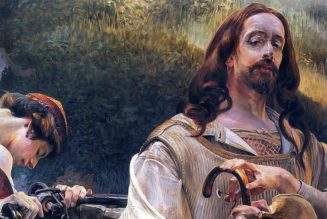
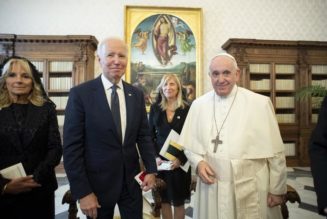
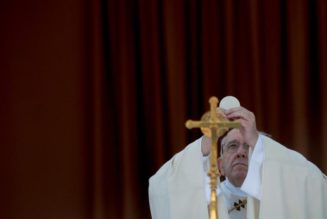

![Erdő vs. Tagle: the battle to be the next pope [Catholic Herald paywall]…](https://salvationprosperity.net/wp-content/uploads/2022/08/erdo-vs-tagle-the-battle-to-be-the-next-pope-catholic-herald-paywall-327x219.jpg)
